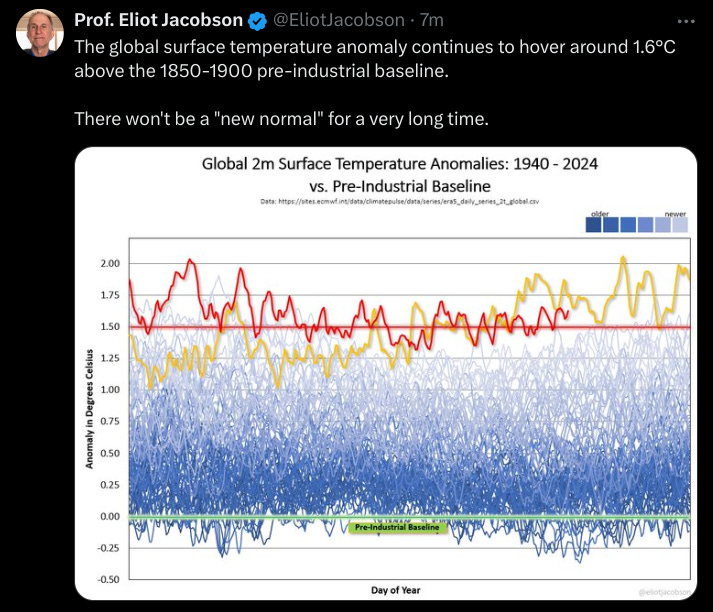Yves here. This latest climate observation is a very large addition to a long and growing list of unsavory developments, at least as far as the survival of such a dim thing as modern life seems. It seems unlikely that very inefficient carbon sinks were considered in the climate simulations. So this development is like a big acceleration.
Written by Thomas Neuburger. It was first published in the book God’s Spies
I don’t really like weather alarm posts these days for reasons already mentioned (see “Name a Damn Perp”).
But the weather news posts, on the other hand, we should watch out for – especially, posts about unexpected changes in “disaster planning.” We have been taught by those who got rich in the oil economy that “it is okay to worry later; The problem won’t come for decades, if ever.”
Unfortunately for them and for us, the news that the problem isn’t fixed in the system seems to pop up all the time. This is one of those stories.
Carbon Sinks Fail
From The guard we read:
Trees and land absorbed almost no CO2 last year. Is the natural carbon sink failing?
The sudden collapse of carbon sinks has not been factored into climate models – and could accelerate global warming.
A carbon the sink is a substance or process that removes CO2 from the air. Our oceans are CO2 sinks. CO2 in the air dissolves in seawater the same way it dissolves in normal water. There are other CO2 removal processes that work in the ocean. Like this one:
It starts each day at night. As the light fades, billions of zooplankton, crustaceans and other marine life rise to the surface to feed on microscopic algae, which return to the depths at sunrise. Debris from this frenzy – the largest migration of species on Earth – sinks to the bottom of the ocean, removing millions of tons of carbon from the atmosphere each year.
This activity is one of the thousands of natural processes that control the Earth’s climate. Together, oceans, forests, soils and other natural carbon sinks absorb nearly half of all human emissions.
After the obligatory “scientists are worried” text that comforts the uneasy (more on that below), we see this:
In 2023, the hottest year on record, the findings of an international research team show that the amount of carbon absorbed by the world has temporarily fallen. The end result was that the forest, plants and soil – as part of the net – absorb almost no carbon.
There are warning signs at sea, too. Greenland’s glaciers and Arctic ice are melting faster than expected, disrupting the Gulf Stream and reducing the rate at which the ocean absorbs carbon. For algae-eating zooplankton, melting sea ice exposes them to more sunlight — a change scientists say could keep them at depth for longer, disrupting the vertical migration that stores carbon at the bottom of the ocean.
According to one of the scientists involved in this study, “Nature has so far limited our abuse. This will end.”
After the disclaimer – this can be temporary; everything is still going well – the author says this:
The type of rapid sinkhole collapse seen in 2023 was not included in most climate models. If it continues, it raises the prospect of global warming faster than those models predict.
Indeed.
Note: ‘Scientists Are Concerned’
The third paragraph, high enough in the Guardian piece to actually be read, says: “But as the Earth warms, scientists are increasingly concerned that those vital processes are breaking down.”
This is the main part of the story’s meta content. This phrase, although accurate, focuses on the scientists, not the problem, and emphasizes their “concern”, a gentle emotion.
A better, more accurate statement is: “Those important processes are breaking down.” Time.
Because they are. The source of the Guardian article makes that clear. The authors state that “the CO2 growth rate was … 86% over the previous year” (true), yet CO2 emissions only increased by “0.1 to 1.1 %” (another fact). Why is there a difference? CO2 removal has slowed or stopped.
It’s a simple equation. Air intake number. The rest is another number. The difference, minus b, is what is subtracted. The amount issued last year is much less than any previous year. The paper accounts for fluctuations and delays. The data and scientists are clear: The carbon sink effect will “end.”
The guardhowever, it can only assuage your fears rather than provide you with accurate facts. So “scientists are worried,” not “this is what’s going on.” The reader can decide who it is The guard it protects.
Be prepared
Another failure of the climate is that the problem is premature as our rulers describe it. (Their invention is anything that prevents you from feeling afraid.)
Warming is already above the +1.5°C threshold that the IPCC has declared catastrophic.
And +2°C is not far behind.


Source link